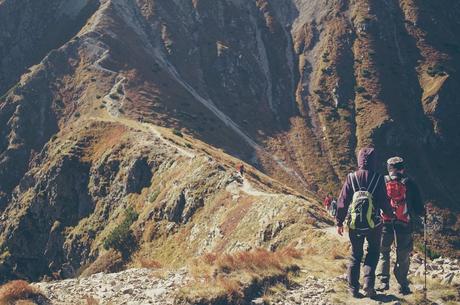Hello Friends,
I live in a hilly area, perfect for a weeknight power walk (with ten pounds in my backpack). A few days ago I was walking up a half mile hill when I passed Annie's house. Exchanging pleasantries, she asked why I was wearing a backpack and wondered why I wasn't running. Her reaction to my explanation was priceless. I can't tell you how many people want to know why I want to hike Everest.
Why!?
It's in these moments when it's clear I'm preparing to do something few have on their bucket list. I need to come up with a clever response!
I will be hiking on Everest in 14 weeks.
As with most first experiences, I didn't know what to expect when I climbed Kilimanjaro. Looking back there was a 24-hour window I do not need to experience again, one that Bill will tell you was unsettling since he wasn't able to help me. We reached the summit before camping in a crater for the night, the next morning we had to summit a second time. Being above 19K for 24 hours was too much for me.
So... as I prepare to hike to Everest Base Camp, I am aware of how my body might react above 18K, and this motivates me to train for everything within my control.
The Backpack
When we climbed Kilimanjaro, it was a new experience for us, but I was also just six months out from being treated for Lymes. We paid a porter to carry our packs. My Porter was promoted from the kitchen tent to carrying my pack, earning his first ever summit.
Understanding this may help you understand why carrying my pack feels like a big deal.
I will be carrying a 38L Gregory pack, more than enough room for our Everest hike. Carrying up to three liters of water, down jacket/fleece, rain gear, snacks, camera, medical kit, valuables and sun cream.
I will train with my pack - carrying a 15-pound backpack or 6-8 hours a day, for twelve consecutive days a few weeks before we fly to Istanbul.
Experience & Training
Readiness for everything but how my body adapts to altitude is key. A quick search online tells you that if you have not trained your body to withstand the pressures of constant strain at high altitude, you will find it a difficult task on the trek. Noted.
Training
It is recommended to spend at least four days a week doing intense physical exercise, for approximately three to four months prior to the trek. Being a runner, I prefer my heart rate sitting between 120-140BPM, so I will need to work on intensity.
Eight weeks before the trek I will begin multi-day walks, with a goal of walking 76 miles, with my backpack, over nine days a few weeks before we leave.
During the week
Above is the training plan I have built, based on a few online sources. Logging most of my training on the weekends, I plan to spend four days a week walking uphill for one hour to two hours (with my backpack).
Weekends
Most of my hiking will be on my favorite trail, the Yellow. It's a five-mile trail with three steep hills, connected to the red and blue... I will have plenty of options to hill work.
June - July
You may have realized that carrying 15-20 pounds is my greatest concern. Being a distance runner, I have zero upper body strength.
I spent the month of May carrying five pounds in my Camelbak, moving up to nine pounds just last week. It took just one uncomfortable hike to learn that I placed the weights incorrectly. After moving six pounds at the top, and three near the bottom, I hardly noticed the weight during the next hike. I will carry this a few times a week to make sure I am strong enough in the fall. With the altitude a wild card for me, I do not want this to play a factor.
Tips and Advice... please
Have you hiked for days? What should I make sure to pack that may not be on my packing list?


